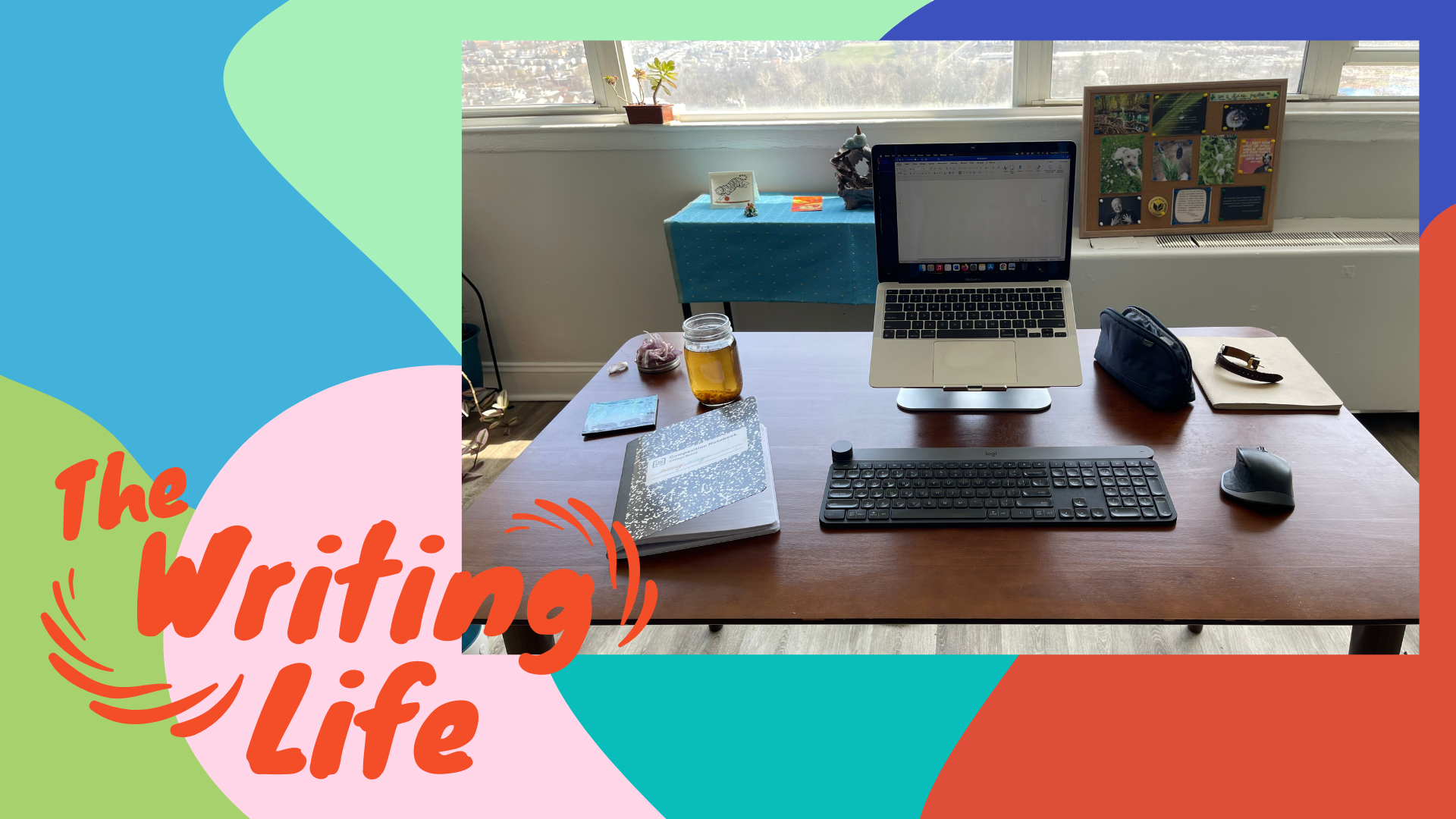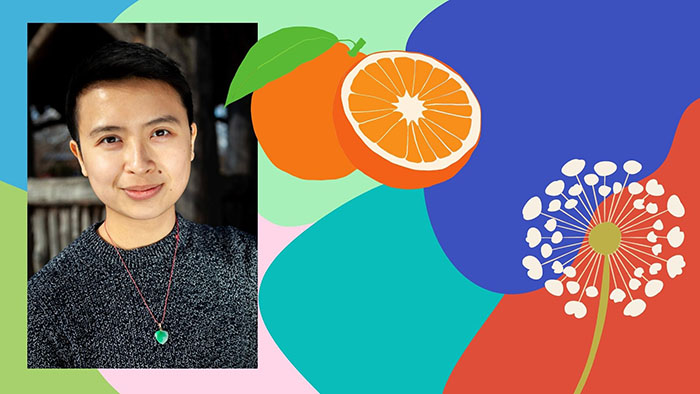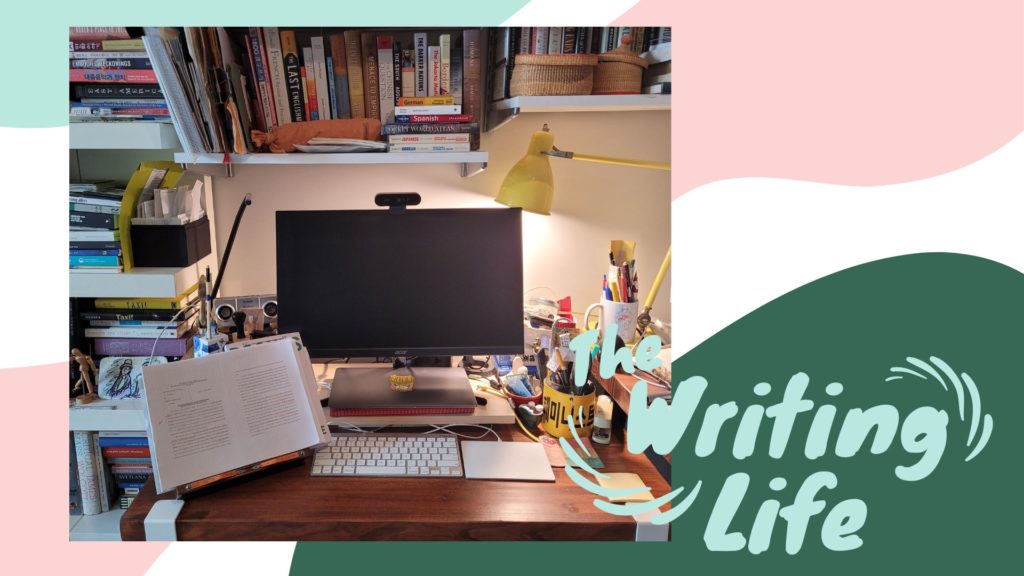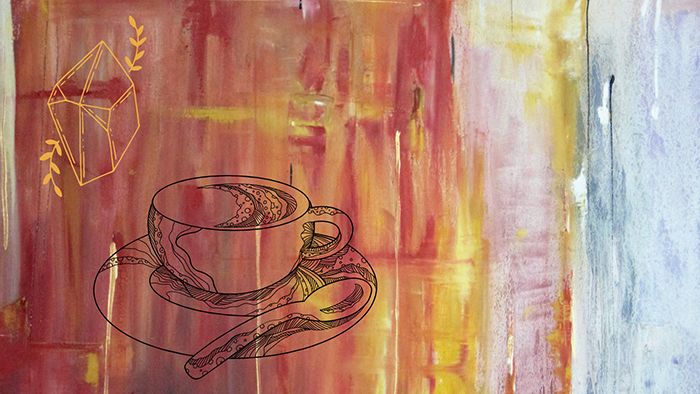Former Open City fellow huiying b. chan answers ten questions, plus one open-ended one, about their writing life

June 2, 2022
“Writing is easy,” Pulitzer Prize–winning sportswriter Red Smith once said. “All you do is sit down at a typewriter and open your veins, and bleed.” Putting pen to paper (or fingers to a keyboard) is never a simple task, even for seasoned writers. Even our Margins and Open City Fellows—and there’s quite a handful of them—can attest to that. Many of them, though, have gone on to write and report for mainstream publications and publish books. In this series, we reached out to our former fellows and asked them to give us a glimpse of their writing lives and to share some tips on how they navigate this creative process called writing.
As a 2018 Open City Fellow, huiying b. chan reported on the intersections between the arts and community organizing in NYC’s Chinatowns. In “Sweeping Away Evil in Chinatown,” he wrote about a century-old, family-run porcelain shop that transformed itself into a cultural organizing space dedicated to promoting the arts for social change by nightfall. huiying also traveled to trace his family roots in villages in Toisan, China and wrote a step-by-step guide on “How to Start Your Family Roots Search.”
His “Mapping Displacement and Resistance in Sunset Park” shows how arts and technology can preserve intergenerational neighborhood stories and fight back against gentrification. As a historian, huiying also sat down with core organizers of an all-women labor union and reminisced about the impact of the 1982 Chinatown garment workers strike in “How Chinese American Women Changed U.S. Labor History.”
huiying reflects on his writing life through writing what he loves best, poetry.
—Noel Pangilinan
1. What’s on your nightstand?
what we hold close speaks to us in the night. dreams are medicine. dreams are magic. dreams allow us to be in & out of worlds. this one book, these three stones, portals to what once was, what is, & what can be. what do you hold close & how closely do you listen?
2. If you had a superpower, what would it be? Why? And what would you do?
each of us holds gifts on this earth. it is in our divine birthright. our dna. how deeply do we tap into that which is within? how deeply are we willing to go to uncover what was once taken? superpowers, not hypotheticals, but already-possible’s. what about you was too much as a child? when were moments you were too sensitive? how do you hold what you were told was never meant to shine, never meant to be seen? we have an obligation to our power within. we have an obligation to be who we thought we could never be. it is written in the stars. you & i have this in common.
3. Coffee or tea? Why?
i come from a people who knew how to speak with & listen to the land. i come from a people who recognized the lives of beings without moving feet. i come from a people who first turned to themselves & their grandmothers when they fell ill, when their stomachs grumbled, when their temperatures rose. i come from a people who knew how to create medicine from all parts of a plant. & the parts that could not be consumed, used for spells to break curses, to write new paths, at a time when what & who governed was outside their controls. we turned to the spiritual, the realms of the unseen for guidance. & it is here that the work, the battle is still to be won.
4. Any writer who influenced you growing up?
children could time travel. children were superheroes. children solved mysteries. children had photographic memories. children levitated energy with their minds. memory was not linear, & it still lived. i saw myself in these children, & these children became me, across space & time.
5. Do you have a writing ritual?
my mind maps the places i’ve been, the people i’ve looked into the eyes of. my body holds memories of our brushed shoulders, the heat of our hands touching, the outstretched palms of my aloe, umbrella tree, & pothos reflect my state of mind. when i haven’t written for weeks, i have been living. writing is life, as breath is. writing is another way of saying that which matters most to me, that which i always make time for, she who is always with me, he who is a part of me. writing is connection to Spirit. to the Divine. to the gods in each of us. lately, i have been walking inside poems.

6. How do you deal with writer’s block?
that which you are afraid to write, write it. that which you are afraid to feel, feel it. it is through looking at yourself for all of who you are, away from pretenses & pretends, that we reveal why it is we write. it’s an itch that keeps on surfacing. signs that keep appearing, in conversation, in passing, on the side of a truck that speeds down the road in front of you. we cannot run away from our feelings, from our past selves. when we face who it is we try not to be, the poem becomes truer.
who are you outside of who you think you have to be? who are you outside of what you think you have to write about? what do you have to say that you believe is not interesting? even Audre Lorde had to convince herself that what she was writing was not complete shit. even Gloria Anzaldúa consistently wrote against & despite her ingrained self-doubt. Alexander Chee says, it is only in amerika that we as writers think who we are & what we have to say is perpetually not enough, as a pretense of the profession. when all of that burns into the bonfires of our life choices & decisions, what do you have to say?
7. Did you ever consider writing under a pseudonym?
here, we change our name when it feels right. here, names are not gendered. here, names, just another marker of who we feel most close to in one given moment in time. so many of us are beholden to the expectations, histories, lineages of a name. so many of us unidentify with the name we are given at birth & yet, live in a society in which names are legal documents, permanent markers, nine numbers to track & validate an existence. what is a pseudonym but another way to declare oneself? call me Dandelion.
8. What’s your fondest memory of being an AAWW Fellow?
i grew up being told i was not enough, culturally & from capitalism. being in community with other people who lived parts of this became everything. under the row of spotlights, i learned there was work to do to bridge how i saw myself, & how others saw me. today i see where those years of work have taken me. today i am here.
9. If you didn’t write, what would you do for work?
we all steward land. we all know how to grow cherry tomatoes & eggplants, the same way we know how to multiply. we know where & who our food & its seeds come from. schools are places of liberatory learning & joy. we know how to style hair, how to mend wounds with crushed plant leaves, the healing salve of saliva. each of us is connected to our superpowers of singing, drum playing, writing, illustrating, cooking, dancing, child-tending. each night, we gather around the bonfire to fuse our songs. in the winter, the living room becomes gathering ground, we have many words for love, as Inuit & Yupik people do for snow. we drink freshly squeezed orange juice whenever we please. we know how to compost our food & happily feed earthworms.
10. What one thing would you give up to become a better writer?
i stopped sacrificing myself for the greater good. i stopped giving myself up for an intangible collective. i stopped losing myself against a system i did not create. i now know each of us are spirits who are genderless. i now know this moment is one in a greater arc of time. there is longevity to this life. i declare it. i now know my ancestors helped pave this road of freedom, multitudinous, in more ways than i can name, though i feel it. i now know it is my turn to walk it. i now know they are a call of incense away. i now know, my one goal, a liberated life.
11.
an elder once asked, who are we? in the scale & span of this universe.
may the life i live answer that, with the clearest intention & purpose.
may all winding paths lead me to the truest answer.
Other stories in The Writing Life series:
Cut Down the Quotes . . . Include Only Gemlike Phrases by E. Tammy Kim
I Am Still Developing as a Writer by Hannah Bae
Write a Sentence—Any Sentence—No Matter How Bad It Is by Astha Rajvanshi
Intuition Is My Main Tool by Chaya Babu
Writer’s Block? What’s That? by Humera Afridi



